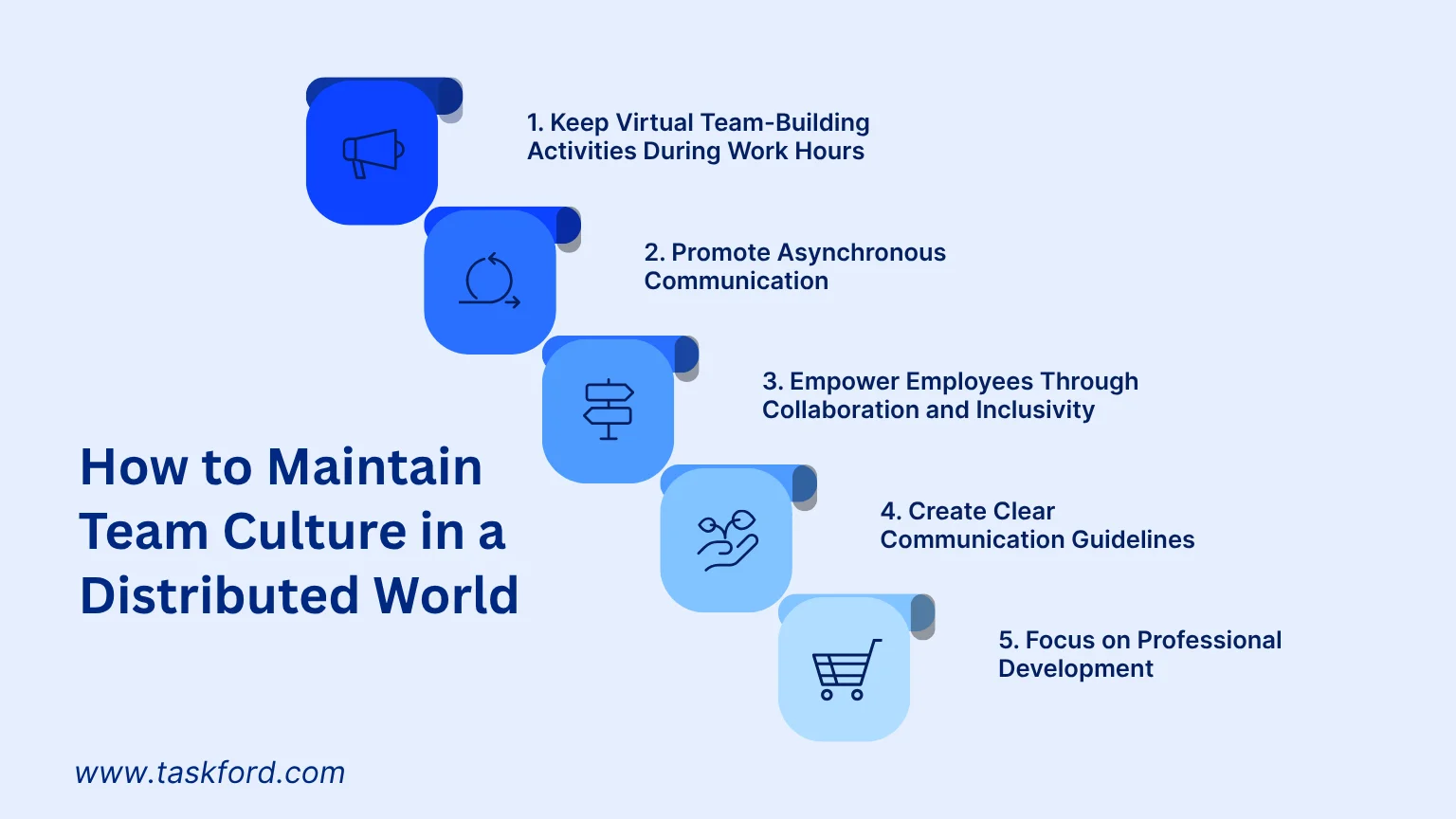Beyond the Meeting: How to Maintain Team Culture in a Distributed World
Explore how organizations can maintain remote team culture, while keep engaged, connected, and productive in a distributed world.
The shift to remote work has been one of the most transformative changes in the workplace over the past few years. What was once a rare arrangement has now become the norm for many companies, accelerated by global events such as the COVID-19 pandemic. The traditional office environment, where team culture was built around daily face-to-face interactions, spontaneous conversations, and team-building exercises, is no longer the default for many organizations. As teams become increasingly distributed across different cities, states, or even countries, the challenge arises: How can we maintain a strong, cohesive team culture without being physically together?
This question is particularly relevant in a world that has embraced remote work. But here’s the good news: maintaining team culture in a distributed world is not only possible but can be incredibly rewarding. It requires intentional effort, creativity, and the right mindset. In this blog, we’ll explore how organizations can keep their teams engaged, productive, and culturally connected even when they’re scattered across the globe.
Learn more: 10 Proven Team Management Tips for Enhancing Collaboration in 2025
Why Maintaining Team Culture Matters
In a remote or distributed work environment, team culture plays a crucial role in ensuring long-term success, employee satisfaction, and organizational health. While team culture is often associated with in-person office environments, it is just as, if not more, important for remote teams.
Here's why maintaining team culture matters:

1. Fosters Engagement and Motivation
A strong team culture helps employees feel connected to their work and the company’s mission. When employees understand and align with the team’s values, they are more likely to be engaged and motivated in their roles. Remote work can sometimes lead to feelings of detachment, especially if workers don’t feel connected to the company culture. A cohesive and inclusive culture ensures that remote workers feel like they are part of something larger, fostering pride in their work and a sense of ownership in the team’s success.
2. Builds Trust and Collaboration
Trust is the foundation of any successful team. In a remote environment, where face-to-face interactions are limited, building and maintaining trust becomes even more critical. A well-established team culture creates an environment where team members feel safe to share ideas, voice concerns, and collaborate effectively. Without trust and a positive culture, communication breakdowns, misunderstandings, and conflicts are more likely to occur.
3. Promotes Innovation and Problem-Solving
Teams with a strong culture are often more creative and innovative. When team members trust each other and feel psychologically safe, they are more likely to share ideas, experiment, and take calculated risks. A positive culture encourages open communication, constructive feedback, and collaboration, all of which are key to problem-solving and innovation. For remote teams, this means fostering an environment where everyone feels empowered to contribute ideas, no matter their location.
4. Ensures Alignment with Company Values and Goals
Maintaining a strong team culture ensures that employees are aligned with the company's core values and objectives. In remote work environments, where employees may be physically distant from leadership, it can be easy for employees to lose sight of the company’s vision. A strong culture helps reinforce the organization’s mission, keeping everyone focused on shared goals and encouraging them to work together toward achieving them.
How to Maintain Team Culture in a Distributed World
Maintaining a strong team culture in a distributed or remote work environment is crucial for fostering collaboration, ensuring productivity, and improving employee satisfaction. Unlike traditional office settings, where spontaneous conversations and in-person team-building activities can naturally occur, remote teams face unique challenges. However, by being intentional about the strategies and practices you implement, it’s entirely possible to cultivate a positive, cohesive team culture even when working across different time zones and locations.
Here are some effective strategies to maintain a thriving team culture in a distributed world.

1. Keep Virtual Team-Building Activities During Work Hours
In a distributed world, virtual team-building activities are an essential tool for fostering connection and collaboration among remote workers. However, it's crucial to make sure that these activities take place during work hours rather than outside of them. When team-building activities happen after hours, it can interfere with employees' personal lives, especially those living alone or feeling isolated. To avoid burnout and resentment, virtual events such as trivia games, virtual happy hours, or team challenges should be scheduled within work hours, making them accessible without encroaching on employees' downtime.
2. Promote Asynchronous Communication
In a distributed team, not everyone will be online at the same time, and that's okay. Asynchronous communication is a powerful strategy that helps bridge the gap created by different time zones. By using asynchronous communication, you can ensure that every team member has an equal opportunity to contribute. It also reduces the stress of having to attend endless meetings and gives employees the flexibility to work when they are most productive. This approach supports a healthier work-life balance and encourages a more thoughtful, considered approach to communication.
Learn more: How to Write a Communication Management Plan
3. Empower Employees Through Collaboration and Inclusivity
A strong team culture thrives when everyone is empowered to collaborate, contribute ideas, and share feedback. It’s crucial to ensure that all team members, regardless of their location or role, feel included and valued. This can be achieved by using collaborative tools and encouraging open discussion in all aspects of the work.
Additionally, ensure that everyone’s voice is heard. This could involve creating feedback loops where employees can voice their opinions about team processes, culture, or anything they feel could be improved. Inclusivity is also about fostering an environment where people from different backgrounds, experiences, and perspectives feel they belong and are valued.
4. Create Clear Communication Guidelines
Establishing clear communication guidelines is essential for ensuring that remote teams can collaborate efficiently and avoid confusion. In a distributed work environment, team members may rely on a variety of tools, such as email, chat apps (like Slack or Microsoft Teams), and project management software (like TaskFord, Trello, or Asana). Defining when and how each communication tool should be used can help streamline communication and prevent misunderstandings.
For instance, you may decide that chat apps are used for quick, informal conversations, while emails are reserved for more formal, in-depth discussions. Additionally, clarify when team members are expected to respond to messages and what the expectations are around after-hours communication. Establishing these norms can help everyone understand how to communicate effectively, which tools to use, and what the response times should be.
5. Focus on Professional Development
Supporting the professional growth of your team members is another way to strengthen team culture. When employees feel like they have the opportunity to learn and grow, they are more likely to stay engaged and satisfied with their work. Professional development can take many forms, including virtual training sessions, mentorship programs, access to online courses, and providing opportunities for career advancement within the company.
Encourage employees to develop new skills or explore new areas of interest related to their roles. Not only does this help individual employees feel supported, but it also contributes to the growth of the team as a whole, as skilled employees contribute to the overall success of the team. For remote teams, offering virtual workshops or online learning resources can be a great way to invest in your team’s future.
Final Thoughts
Maintaining a strong team culture in a remote or distributed work environment is not only possible but it can also be deeply rewarding when approached with intention and creativity. The challenges that come with physical distance, such as a lack of spontaneous conversations and face-to-face interactions, can be mitigated by thoughtful strategies like promoting asynchronous communication, hosting virtual team-building activities, and fostering an inclusive, collaborative atmosphere.
When a team culture is nurtured through trust, engagement, and clear communication, remote teams are empowered to thrive, innovate, and stay aligned with company goals, despite being spread across different locations and time zones. It’s crucial to remember that a positive culture isn't something that happens by chance; it’s built through consistent efforts, genuine inclusion, and a shared commitment to each other’s growth and success.
By focusing on inclusivity, professional development, and clear communication, organizations can ensure that their teams not only stay connected but also feel supported and motivated in their roles. At the end of the day, the strength of a team lies in its people, and with the right practices in place, remote teams can be just as cohesive, productive, and culture-rich as their in-person counterparts.
Making work simpler,
smarter, and more connected
Join our waitlist and be notified first.

Related Blog
Subscribe for Expert Tips
Unlock expert insights and stay ahead with TaskFord. Sign up now to receive valuable tips, strategies, and updates directly in your inbox.






